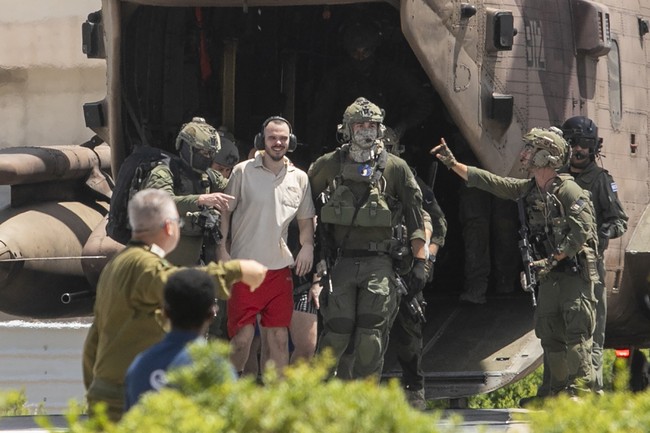We support our Publishers and Content Creators. You can view this story on their website by CLICKING HERE.

Has hostaging lost its value in the Middle East? Or better yet, has Benjamin Netanyahu killed the market for it? You might be surprised at who has re-evaluated it.
Advertisement
The father-in-law of the man currently believed to run al-Qaeda made a public salute to Yahya Sinwar yesterday, who got caught above ground this week and killed by an IDF unit near Rafah. Mustafa Hamid, aka Abu Walid al-Masri, then told Hamas to release the hostages back to Israel, according to the SITE Intelligence Group, which monitors terror communications. The Times of Israel also passes along Hamid’s reasons for the capitulation:
The online declaration was made yesterday by Mustafa Hamid, also known as Abu Walid al-Masri, who is the father-in-law of Saif al-Adel, the man widely believed to now head Al-Qaeda, according to SITE. …
Hamas must now “immediately” return the hostages and their bodies, and “this file must be closed and not opened again, as we know its consequences,” according to the statement.
“No one cares about the Palestinian prisoners, neither in the media, in negotiations, nor in demonstrations,” it adds.
Several experts consulted by AFP say Hamid is close to higher-ups in the core Al-Qaeda organization.
Being high-up in AQ may not mean a lot to Hamas, especially at the moment. The two groups share no real connection, and perhaps compete against each other in some ways. AQ and ISIS are not affiliated with the Iranian proxy jihadists, although they do share a common philosophy and theology with the Muslim Brotherhood and especially the Islamist ideologue Sayyid Qutb. Criticism between the groups is nothing new, however, and in the middle of a hot war may not be either welcomed or considered.
Advertisement
That doesn’t make it meaningless. Hamid’s warning to Hamas to close the “file” on the hostages — and especially to never re-open it — demonstrates that Netanyahu has achieved a significant change in the region. For decades, Hamas and other terrorist organizations (including Hezbollah) routinely captured hostages because they knew there would be no penalty for it. They used hostages to wring concessions from the Israelis and to leverage the West into pressuring Israel into asymmetric deals to end conflicts once they started going badly for the terrorists. The year of destruction and the elimination of leadership in the two major Iranian proxies are the “consequences” to which Hamid refers.
Will the remnants of Hamas leadership take this advice? Probably not, and especially not right away; they need to have some sort of victory narrative to survive the utter ruination that Sinwar created for them to have any hope of influence in post-war Gaza. This is a kind of sunk-cost fallacy, of course, but the immediate replacements for Sinwar et al can’t afford to acknowledge it. Any capitulation would likely cost them their lives as their even more lunatic underlings would see it as an opening to seize control.
Of course, Hamid may intend to shift that Overton jihadi window to give Sinwar’s replacement some political support for a capitulation. If AQ has any influence among those still left in Hamas, perhaps it might allow for a face-saving concession on the hostages in return for a cessation of hostilities.
Advertisement
One thing is very certain, though. Israel has restored its deterrent power in the region, so much so that even other terror groups are acknowledging the “consequences” of their previous hostaging strategies. That doesn’t mean they will stop trying to destroy Israel, but it means they do understand that the Israelis are no longer going to play along with those strategies, and instead will conduct a real war to destroy its enemies if they attack.
Iran may find that out within the next few days, too. One has to wonder whether Tehran isn’t giving Hamas the same advice as Hamid as a way to avoid that lesson. Stay tuned.

 Conservative
Conservative  Search
Search Trending
Trending Current News
Current News 







